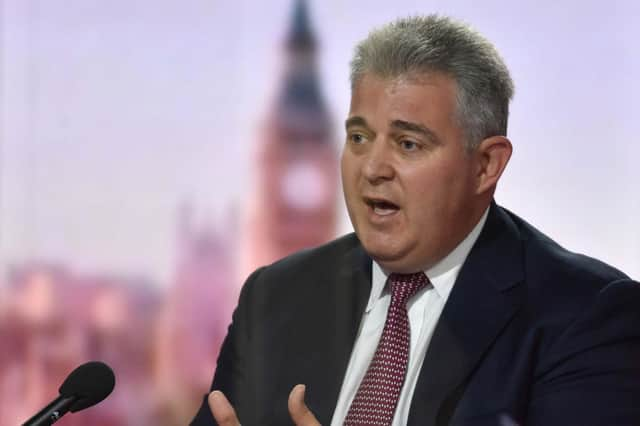Troubles ‘amnesty’ appears to be a step closer with roundtable talks


Following the virtual meeting with NI Secretary Brandon Lewis, Sinn Fein’s Declan Kearney said he believed the ‘statute of limitations’ legislation would be implemented “imminently”.
The contentious proposals, which PM Boris Johnson said would allow Northern Ireland to “draw a line under the Troubles”, would ban all prosecutions, including for murder, and also end all legacy inquests and civil actions.
Advertisement
Hide AdAdvertisement
Hide AdMr Kearney said: “Brandon Lewis simply said that they would give us a call before they brought the legislation forward in Westminster.”
Speaking after the meeting, DUP leader Sir Jeffrey Donaldson repeated his opposition to the proposals, saying “victims must be put front and centre”.
Earlier this year the Tory administration published a command paper outlining its intention to introduce a statute of limitations on crimes committed during the conflict up to April 1998 that would apply to military veterans as well as ex-paramilitaries.
In addition to ending legacy inquests and civil actions, the package of measures included a new truth recovery body and an oral history initiative.
Advertisement
Hide AdAdvertisement
Hide AdBut the move has been condemned by all the main political parties in Northern Ireland as well as the Irish government, and a range of victims’ and survivors’ groups.
Speaking to the media, Mr Kearney said: “The amnesty proposals being brought forward by this government do not command the consent of this society; that there is universal opposition towards their amnesty proposals by all victims and survivors.
“However, today’s meeting is the clearest signal yet that the British government intends to proceed with the drafting and the enactment of legislation to provide amnesty for its state forces.”
Sir Jeffrey Donaldson said: “The government’s proposal for a statute of limitations is not just opposed by every political party in Northern Ireland but the Commission for Victims and Survivors survey showed overwhelming opposition also from victims themselves. If we are to have a truly victim-focused process then the views of those victims must be put front and centre.
Advertisement
Hide AdAdvertisement
Hide Ad“Although the Irish government claim to oppose the direct proposals from the UK government, their inaction and evasion of action in relation to legacy cases in their jurisdiction or where murders were carried out from their territory means that victims are denied access to justice.”
Sir Jeffrey said Dublin cannot “evade their responsibility,” and added: “We need to see specific proposals from them on how they will deal with legacy cases and offer the prospect of justice to victims.”
The Ulster Unionist Party is also opposed to the amnesty proposals.
Deputy leader Robbie Butler said: “The Ulster Unionist Party has consistently highlighted the need to remember the context of the Troubles and that 90 per cent of deaths were due to terrorist actions, 60 per cent republican, 30 per cent loyalists.
Advertisement
Hide AdAdvertisement
Hide Ad“Any amnesty will overwhelmingly benefit former terrorists.”
——— ———
A message from the Editor:
Thank you for reading this story on our website. While I have your attention, I also have an important request to make of you.
With the coronavirus lockdowns having had a major impact on many of our advertisers — and consequently the revenue we receive — we are more reliant than ever on you taking out a digital subscription.
Subscribe to newsletter.co.uk and enjoy unlimited access to the best Northern Ireland and UK news and information online and on our app. With a digital subscription, you can read more than 5 articles, see fewer ads, enjoy faster load times, and get access to exclusive newsletters and content.
Visit
now to sign up.
Advertisement
Hide AdAdvertisement
Hide AdOur journalism costs money and we rely on advertising, print and digital revenues to help to support them. By supporting us, we are able to support you in providing trusted, fact-checked content for this website.
Ben Lowry, Editor